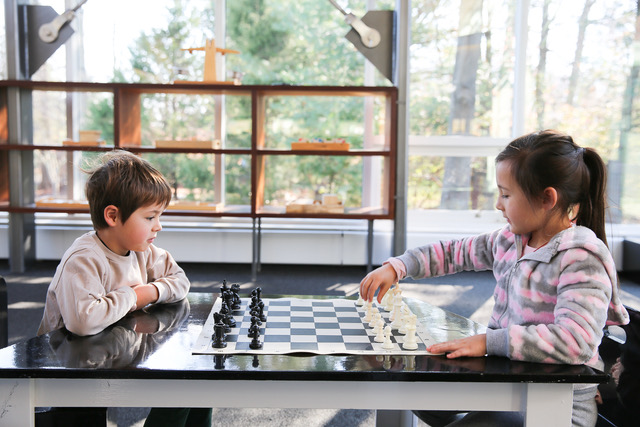If you watch our chess players in action on Chess Night, you’ll see how seriously our students take the game! The children are coached in our chess enrichment program by Alex Eydelman, president of the National Educational Chess Association and a national master, and are tough competitors in local tournaments. Chess is a star player in the curriculum at TCS because it’s not only an immensely captivating game, but also because it’s a powerful brain trainer. Learning to play chess as a child enhances all kinds of cognitive attributes—concentration, memory, logic, critical thinking and problem solving—in the developing brain, as multiple studies show. Indeed, many historians of chess believe the game was invented to help the children of Indian rulers to become strategic thinkers and capable leaders.
Chess is a brain-booster at any age, but research has identified specific benefits for children who play chess:
-
- Chess is a game of recognition and memory. In the beginning, it’s enough for a child to work out how each piece moves. After a few games, though, children begin to plan their grand attack strategy. They also start to think about whether their pieces will come under attack when they move them into a new place. The need to visualize the board and its pieces, and think through possible moves and an opponent’s countermoves, grows a child’s power of concentration. The more games they play, the more comfortable and agile their brains become in recognizing positions and strategies. In the process, both their concentration and memory grow stronger, in a kind of mutually reinforcing “dance.” Hence, studies at the University of Memphis showed that playing chess significantly improves children’s attention span, visual memory and spatial-reasoning ability.
-
- Chess teaches planning and foresight. Children soon discover that to succeed in a game of chess, they need to have a plan before diving into the action. To play the game well means having an idea of what opening to start with and what strategies to pursue in the middle game and end game. Young chess players develop a habit of planning and predicting that applies well to other areas of life—they are learning how to build a strategy and then recover from obstacles in order to capture their opponent’s king.
-
- Chess enhances children’s math, spatial-analysis and reading skills. Research among elementary-school students in the New York City chess program shows that playing chess significantly boosts students’ math performance and spatial-analysis skills. The process of thinking through all the variables of a move teaches logic, and countering an opponent’s tactics is a problem-solving challenge. The game also offers intense practice in spatial analysis, as children have to visualize the changes on the board—without touching the pieces—and picture a position several moves down the line. What was perhaps more surprising in this study was that playing chess also improved children’s performance in reading. The boost in students’ reading skills is likely due to the strong correlation between chess and comprehension, as both the positions on a board and the words on a page require decoding, analysis and understanding.
-
- Chess helps develop logic, critical thinking and … creativity! Playing chess requires a lot of “if-then” logical analysis and “what-if” scenarios, all necessary ingredients for developing logical and critical thinking. In addition, a study of middle school students showed that among creativity-enhancing activities such writing stories and playing imaginative games like Dungeons & Dragons, chess was the most effective at boosting creativity, most dramatically in originality. Researchers attribute this boost to the process of imagining all the possible move alternatives, which trains the mind to play with possibilities … the cornerstone of original thinking.
-
- Most importantly, chess is fun! And just playing for fun still confers all of the game’s cognitive benefits. Indeed, the playful aspect of chess makes it a powerful motivator for children to keep building their problem-solving skills. While certain strategies and tactics can be carried over from game to game, each new game of chess brings a wide range of fresh puzzles to dissect. The infinite variety of chess games ensures that children are continually enhancing their skills. Chess is also an inclusive activity that can be played at all standards, and knowing how to play can be a way to make new friends.
-
- We love chess at TCS because we know the skills being taught through this game go far from the board. You see on Chess Night how the children are learning how to solve obstacles in a creative way. We also encourage you to pull out a chessboard at home and treat everyone in the family to the rigorous workout that chess gives the brain.
Here’s to stratagems and tactics!
Maureen
